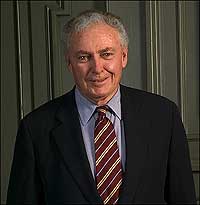Now More Than Ever
The gift the Colonial Williamsburg Foundation most looks forward to opening this holiday season is the one we will save for last, the one labeled "2006." The New Year presents a prospect of months packed with energy, innovation, and excitement.
In January, Colonial Williamsburg will host the inauguration of Virginia's governor at the colonial Capitol—the first to be held on this historic site since 1780, when incumbent Thomas Jefferson was sworn in. Beginning in February, HBO and Playtone Productions are to be in the Historic Area for several months filming scenes for a ten-part television series, John Adams. In March, we introduce our guests to a bustling and politically charged Revolutionary City in the heart of the Historic Area, a central component of the foundation's Education for Citizenship initiative. In May, the Jamestown Settlement's replica square-rigger Godspeed sails up the East Coast, stopping in six cities to herald the approach of the 400th anniversary of Jamestown, the first permanent English settlement in America. In September, we reopen the Conference Center at the Williamsburg Lodge. October brings the 225th anniversary of General George Washington's victory at Yorktown.
All these endeavors are linked and complementary, offering Colonial Williamsburg a rare opportunity to remind the nation of the rich diversity of the experience we offer in the region, and the significance of our educational mission—that the future may learn from the past.
When America's 400th Birthday activities hit full stride in 2007, our Education for Citizenship initiative will have been well launched with the theme From Subjects to Citizens: Our Struggle to Be Both Free and Equal. It connects the challenging beginnings at Jamestown to the progress of citizen-led government in Williamsburg, and the defeat of the forces of monarchy at Yorktown.
The Revolutionary City will be a dynamic interactive environment in the eastern end of the Historic Area around the Capitol where, two hours daily, scripted programming will play out against the lively backdrop of everyday eighteenth-century life and drama. One day we will portray 1774–76, when royal government collapsed and independence was declared; the next it will be 1776–83, Williamsburg at war. The stories we tell will for the first time include those turbulent days when America claimed and fought to secure nationhood.
The inauguration of Virginia's eighty-second governor is a twenty-first-century celebration of a centuries-old ritual, and we are mindful that the commonwealth's first chief executive, Patrick Henry, was installed in this city, too. The Capitol is a link between the citizen participation central to the Revolution's triumph, and the citizen participation still necessary to the success of the American experiment.
Likewise John Adams. It is testimony to Colonial Williamsburg that biographer David McCullough and executive producer Tom Hanks see in the authenticity of our setting the place to film significant portions of the Adams story. Williamsburg is not Adams's Boston, nor his Philadelphia, but it does reflect his style and the culture of his times. Williamsburg may not be his geography, but it surely is his message. Concern about the Revolution and the Constitution is what Adams was about, what that television series is about, and what Williamsburg is about. Now more than ever. Williamsburg's message will be broadcast across America and around the world.
Our expectation is that all these events, and the events to come in 2007, will make a visit to the Historic Triangle a priority for citizens here and abroad. Since our hotels are designated the official lodgings for the commemoration, the completion of the Lodge, the engine of our hospitality enterprise, will be a timely achievement. It will underscore our determination to provide for guests' comfort and enjoyment, a place to relax and reflect on the lessons of the day.
Our efforts in 2006 will make clearer to our guests the connections between what it took to be a good citizen in eighteenth-century Williamsburg and what it takes to be a good citizen now—individual courage, participation, and commitment. Now more than ever.

